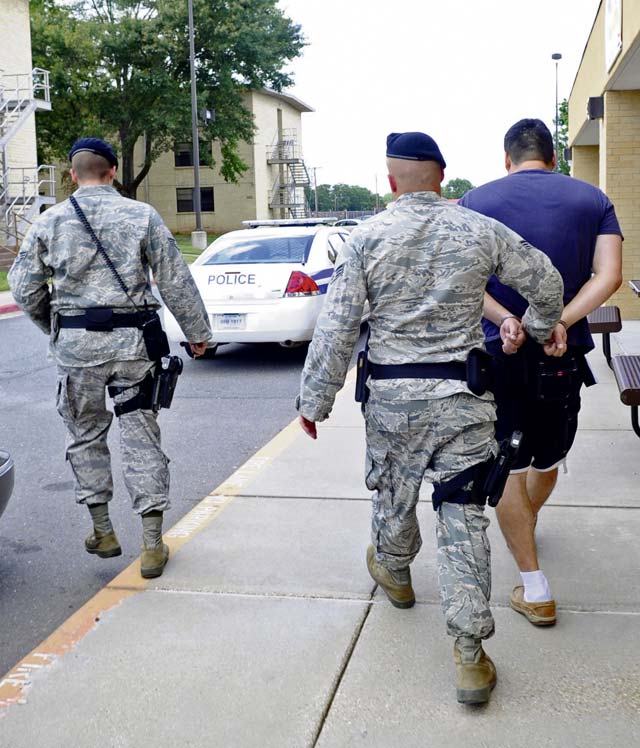
 Three University of California Los Angeles basketball players were caught shoplifting designer sunglasses in China last month, which caused an international incident. More than 5,000 miles away, local stores in the Kaiserslautern Military Community are experiencing the same thing – merchandise loss due to shoplifting.
Three University of California Los Angeles basketball players were caught shoplifting designer sunglasses in China last month, which caused an international incident. More than 5,000 miles away, local stores in the Kaiserslautern Military Community are experiencing the same thing – merchandise loss due to shoplifting.
People caught stealing here have more to lose than you think.
As the holidays approach, there are spikes in shoplifting, larceny and damage to property, said Don Gwinn, U.S. Army Garrison Rheinland-Pfalz Civilian Misconduct Program manager.
“We want to let the community and stakeholders know that we need to prevent or lessen the amount of larcenies that occur during this time,” he explained. “This issue doesn’t only affect teenagers, it includes everyone – officers and enlisted, spouses and civilian employees. It’s incumbent on us to try to limit the larcenies happening in our facilities and the base exchange during the holidays.”
While some students enjoy their winter vacation from school, others may be studying ways to steal merchandise at the BX.
“When schools let out during the holiday break and parents are still working, a lot of our youth will use the Kaiserslautern Military Community Center as a place to gather with friends,” said Robert Leist, USAG RP assistant civilian misconduct officer. “Sometimes, when teens are hanging out there for several hours, they may think they can get away with whatever items they can get their hands on. We just want to make sure parents impress upon their children that stealing from the Army Air Force Exchange Service is not just larceny from the facility itself, but it also takes money AAFES repurposes back into the community.”
To combat would-be thieves, AAFES installed numerous camera systems and employs several plain-clothes detectives to keep an eye out for anything suspicious to include switching sales tags, returning several items without receipts, concealing merchandise and demonstrating questionable behavior.
According to Leist, many times it’s not a matter of money to people. They are just making poor choices that can add up to enormous repercussions – military police reports, investigations, paying AAFES recovery fees and embarrassment for themselves, parents or sponsors, chain of command and worst of all – receiving a larceny record. Additionally, if someone is caught stealing from AAFES, the perpetrator can’t seek employment at any AAFES establishment – ever.
So what happens to those who steal at the KMCC?
“When AAFES Loss Prevention identifies shoplifters, they are processed by security forces or military police, their military identification will be confiscated and they are issued a letter for a temporary confiscated ID card. Within that letter, their base exchange privileges are removed for one year,” Leist explained. “Teenagers can get their privileges back in six months and adults in nine months, if they complete community service and go to counseling. The civilian misconduct office determines the appropriate amount of community service. Additionally, perpetrators also have to pay AAFES a $200 civil recovery fee plus the cost of the item that they are unable to keep.”
Garrison civilian misconduct and the 86th Mission Support Group Civilian Misconduct Office are on the same sheet of music in regard to reprimands to ensure application of policy and procedures are consistent, said Richard Toney, 86th Mission Support Group deputy director.
“Army and Air Force personnel involved in shoplifting cases can be assured that consequential measures are equally applied regardless of service affiliation,” he said. “An average of 30 to 40 Air Force-affiliated shoplifters get caught every year, but within the last four months there were only three incidents. This is a positive development.”
Shoplifting isn’t just a problem on U.S. installations, sometimes Americans shopping in the civilian sector take things from local establishments as well, said Rick Anderson, USAG RP assistant civilian misconduct officer at Baumholder.
“People who are caught shoplifting off post may be required to pay a store fine of €200 to €300 and most incidents will generate a German polizei report as well as a military police report,” Anderson said. “People have to understand there are repercussions for their actions – even off post,” he said.
According to the garrison civilian misconduct office, there was a 49 percent decrease in the number of shoplifting cases in fiscal 2017, but the significant reduction can be attributed to the garrison and 86th Airlift Wing civilian misconduct teams, AAFES Loss Prevention Office and school liaison officers presenting shoplifting prevention briefings at schools and other events to discourage theft during the holidays.
Parents should explain to their children from an early age that stealing is not acceptable behavior and there are negative consequences if they do it, Toney said.
“The sophisticated technology used today allows unparalleled capability to successfully detect and catch shoplifters,” he said. “If caught, the consequences can be severe, such as barment from using facilities and more,” Gwinn agreed with his Air Force counterpart.
“People who shoplift at an early age sometimes will go on to do other crimes later in life, if it goes undetected,” he concluded. “So it’s a turning point for people – it’s wrong, it’s illegal and they need to understand they can’t do this.”
To learn more, contact the KMC civilian misconduct offices:
USAG RP – Kleber Kaserne
Bldg. 3213, Room 101
DSN: 541-2220 or 541-2221
Commercial: 0611-143-541-2220 or 0611-143-541-2221
USAG RP – Baumholder (Smith Barracks)
Bldg. 8698, Room 14
DSN: 531-2733
Commercial: 0611-143-531-2733
86 MSG Civilian Misconduct Office – Ramstein
Bldg. 2401
DSN: 480-7041
Commercial: 06371-47-7041


